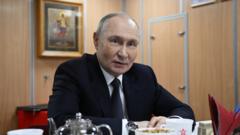The US decision to drop bounties on leading members of the Haqqani network underscores the complex interplay of diplomacy and counter-terrorism in Afghanistan.
US Removes Bounties on Haqqani Leaders Amid Evolving Relations with Taliban

US Removes Bounties on Haqqani Leaders Amid Evolving Relations with Taliban
Bounties lifted on prominent Taliban figures signal a shift in US-Taliban dynamics.
The US government has officially removed financial bounties on high-ranking members of the Haqqani militant network, including Sirajuddin Haqqani, who is not only a key figure in the organization but also serves as the Taliban's interior minister. This decision marks a noteworthy development given that the Haqqani network has been implicated in numerous high-profile attacks during the US military intervention in Afghanistan, which included attacks on US and Indian embassies as well as NATO forces.
This change in policy comes shortly after engaging in diplomatic talks with Taliban officials in Kabul, aimed at securing the release of an American citizen detained for over a year. A US State Department representative confirmed the absence of current rewards for Sirajuddin Haqqani and others, while they maintain their designations as Specially Designated Global Terrorists. This adjustment signifies a potential diplomatic thaw as reinforced by Abdul Mateen Qani, a spokesman for the Taliban's interior ministry, who characterized the lifting of the bounties as the fruit of ongoing diplomatic efforts.
In recent discussions, a US delegation moved past previous tensions to negotiate the release of George Glezmann, an American national held captive in Afghanistan. While it is uncertain whether the lifting of bounties was explicitly connected to this particular negotiation, it is a significant indicator of changing attitudes.
The Haqqani network, founded by Sirajuddin’s father in the 1980s, has transitioned from its origins as a US-supported anti-Soviet entity to a notable terrorist group. The group has historically aligned itself with the Taliban, especially since the latter regained power in Afghanistan in 2021.
In the broader context of Afghan politics, Sirajuddin Haqqani is emerging as a significant player and potential rival within the Taliban structure, particularly in light of ideological divides concerning women's rights and education. Meanwhile, the removal of the bounties may also highlight the increasing international legitimacy the Taliban appears to be gaining—a point which could complicate US foreign policy strategies moving forward.
The evolving dynamics underscore the complexities surrounding international engagement with the Taliban and signal potential shifts in policy approaches as the global community assesses how to interact with Afghanistan's current leadership.
This change in policy comes shortly after engaging in diplomatic talks with Taliban officials in Kabul, aimed at securing the release of an American citizen detained for over a year. A US State Department representative confirmed the absence of current rewards for Sirajuddin Haqqani and others, while they maintain their designations as Specially Designated Global Terrorists. This adjustment signifies a potential diplomatic thaw as reinforced by Abdul Mateen Qani, a spokesman for the Taliban's interior ministry, who characterized the lifting of the bounties as the fruit of ongoing diplomatic efforts.
In recent discussions, a US delegation moved past previous tensions to negotiate the release of George Glezmann, an American national held captive in Afghanistan. While it is uncertain whether the lifting of bounties was explicitly connected to this particular negotiation, it is a significant indicator of changing attitudes.
The Haqqani network, founded by Sirajuddin’s father in the 1980s, has transitioned from its origins as a US-supported anti-Soviet entity to a notable terrorist group. The group has historically aligned itself with the Taliban, especially since the latter regained power in Afghanistan in 2021.
In the broader context of Afghan politics, Sirajuddin Haqqani is emerging as a significant player and potential rival within the Taliban structure, particularly in light of ideological divides concerning women's rights and education. Meanwhile, the removal of the bounties may also highlight the increasing international legitimacy the Taliban appears to be gaining—a point which could complicate US foreign policy strategies moving forward.
The evolving dynamics underscore the complexities surrounding international engagement with the Taliban and signal potential shifts in policy approaches as the global community assesses how to interact with Afghanistan's current leadership.






















